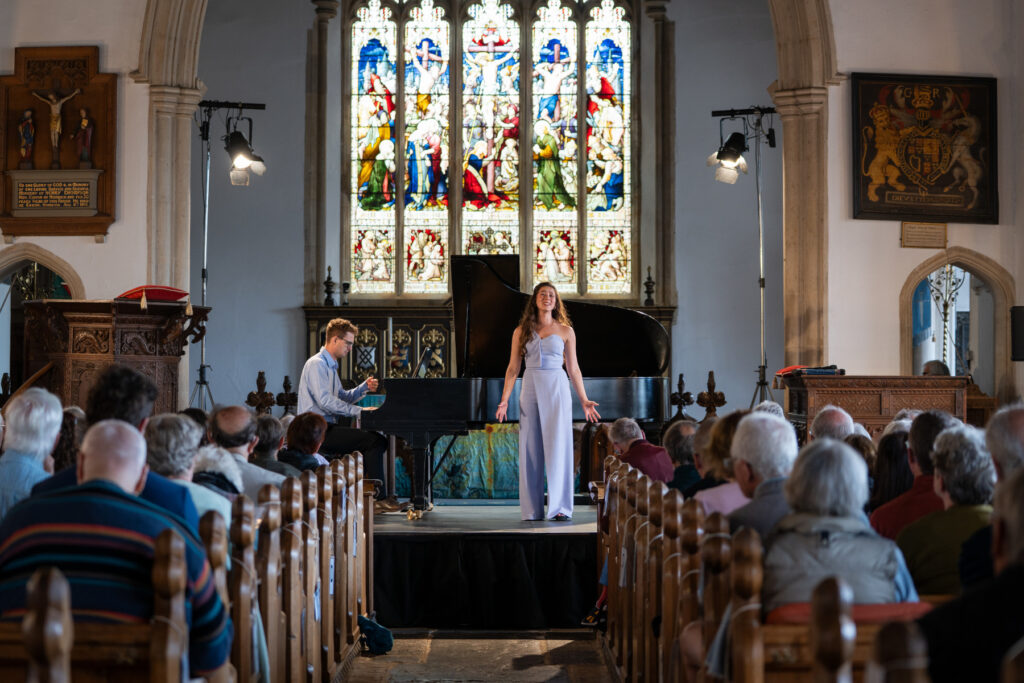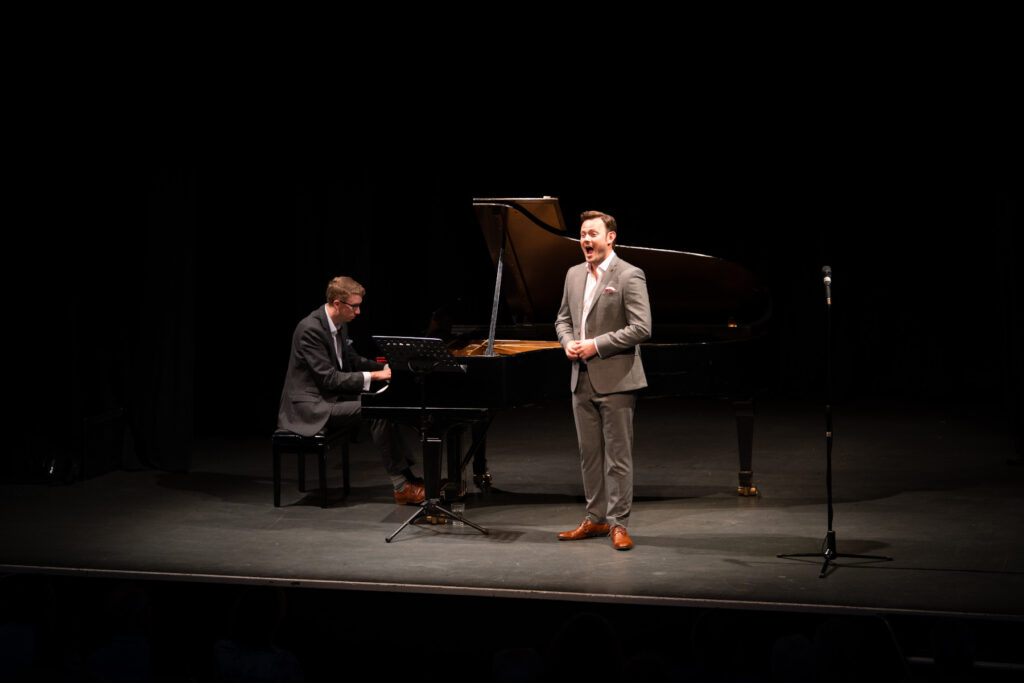I caught up with two recitals during the festival’s final week; the first, Melodies and Lieder, explored French and German approaches to love, nature and what the next world may hold. Its century-spanning repertoire was shared by British Argentine soprano Ceferina Penny and French lyric soprano Lyriel Benameur. Intriguingly, the latter was listed in the Aldeburgh souvenir book as a mezzo, yet it was Ceferina Penny who appeared to be more of a mezzo – certainly judging from a very credible lower register. Both young singers already have considerable recital experience behind them, and this concert in Aldeburgh Church was an admirable demonstration of their talent and programme planning.
Amongst Penny’s contributions, she captured the quasi-religious endearments of Messiaen’s ‘Ta voix’ with a lovely spun line, adding tonal weight to the drama of ‘Les des guerriers’, if not quiet sensing the “iron-clad warriors” of the composer’s faith-based text. She and pianist Archie Bonham neatly underlined the reverie and languor of Mel Bonis’s ‘Songe’ (Trois Mélodies, Op. 91), its Gallic sensibility carried over into Satie’s ‘Je te veux’, where dynamics needed to be more carefully controlled, something that also marred Weill’s tango-inspired Youkali. Earlier, three songs from Hugo Wolf’s Mörike Lieder were well communicated, most convincingly in the storm-tossed drama of ‘Begegnung’ where the agitated emotions of two lovers were given ardent expression.

Highlights of Lyriel Benameur’s choices, with pianist Francesca Lauri, included a pair of songs by the Boulanger sisters. First was Lily’s deceptively simple ‘Si tut ceci n’est qu’un pauvre rêve’ (‘If all were naught but a poor dream’), where its sustained legato and sense of grief was finely achieved. Second was Nadia’s elegiac ‘Versailles’, with Benameur bringing poise to the poet’s preoccupation with memory and transience. Then Fauré’s Cinq mélodies de Venise, begun during a restorative Italian holiday in 1891 at the invitation of Winnarettta Singer, the future Princess de Polignac. Nothing particularly Italian in these Verlaine settings, but Benameur was totally at home in the music’s craftsmanship and Gallic elegance, bringing out the sharply contrasting joy of ‘Mandoline’ and the bliss of ‘En sourdine’. “Love’s sweet tumult” was nicely etched in ‘Green’ and the perfumed harmonies of ‘ÀClymène’and‘C’est Extase’ drew singing of rapt concentration. No less compelling was her rendition of six songs by Clara Schumann, setting words by Paul Heyse and beguiling for their artlessness. Benameur seemed to blossom in these songs, a subtle transformation that garnered captivating performances to match their charm and beautiful simplicity.
And there was charm in abundance a few days later in a group of songs by Imogen Holst, which formed part of a morning recital by Nick Pritchard and Ian Tindale at Aldeburgh’s Jubilee Hall. As the daughter of one illustrious composer and the close musical confidant of another, Holst’s musical personality has been steadily emerging in the UK. Pritchard and Tindale clearly thought highly of ‘Weathers’ (1926), Little think’st thou poore flower (1937) and Four Songs (1944), a cross section of Holst’s song output that puts paid to the once familiar observation of her talent hiding in plain sight. (Earlier this year she was Composer of the Week on BBC Radio 3, and in October, Signum will be releasing a new disc (Little Wanderer) to include several of her songs performed by this established duo.) Each of her Four Songs inhabit a different tone, variously jaunty, poignant, restless and solemn, and reveal a genuine compositional technique. Pritchard and Tindale did them proud.

Proceedings had opened with Britten’s Winter Words (1953), settings of Hardy requiring bravura declamation and intimate expression – both communicated with obvious involvement. So too were the poet’s concerns of urban development and nature, pointedly expressed in ‘Wagtail and Baby’ where Pritchard gently probed its heartfelt message. Singer and pianist were thoroughly at ease with the leaping figures of ‘At Day-Close in November’, its poignancy not lost on them. Two songs involving trains and boys – one travelling third-class, the other playing the violin at a railway station – brought out vivid storytelling, bleakness too for the youngster and ironic glee for the handcuffed convict in ‘At the Railway Station, Upway’. Equally well served was the narrative recitative and ghostly hymn-playing of ‘The Choirmaster’s Burial’, Pritchard deftly transforming from innocent chorister to pompous vicar. Throughout, Tindale was flawlessly sensitive and his imitations – birdsong, creaking furniture, steam trains and solo violin – were brilliantly acute.
The morning included three William Blake settings, entitled Songs of Illumination, by Daniel Kidane, one of two Aldeburgh Festival featured composers. This trio of songs (2018) inhabit a dreamlike investigation of society’s marginalised and vulnerable,largelytaking the form of smooth vocal recitation over impressionistic piano textures. They are well worth hearing again from these two persuasive collaborators who ended their recital with a handful of Britten’s folksongs – delivered with affection and warmly received from a packed audience. Recitals like this don’t get much better – utterly magical!
David Truslove
Mélodies and Lieder
Hugo Wolf – ‘Nimmersatte Liebe’, ‘Neue Liebe’, ‘Begegnung’ (Mörike Lieder); Joseph Marx – Hat dich diel Liebe berührt; Lili Boulanger – Si tut ceci n’est qu’un pauvre rêve;
Nadia Boulanger – Versailles; Gabriel Fauré – Cinq mélodies de Venise; Olivier Messiaen – ‘Ta voix’ and ‘Les des guerriers’ (Poèmes pour Mi); Mel Bonis – Songe; Kurt Weill – Youkali; Erik Satie – Je te veux; Clara Schumann – Sechs Lieder (Op.13); Wolf – ‘Mein Liebster singt am Haus im Mondenscheine’, ‘Was soll der Zorn, mein Schatz?’, ‘Ich hab’ in Penna einen Liebsten wohnen’ (Italienisches Liederbuch).
Ceferina Penny – soprano; Archie Bonham – piano; Lyriel Benameur – mezzo; Francesca Lauri – piano.
Aldeburgh Church, 24 June 2025
Songs of Illumination
Britten – Winter Words; Imogen Holst – Weathers, Little think’st thou poore flower, Four Songs (1944); Kidane – Songs of Illumination; Britten Folksong arrangement selection
Nick Pritchard – tenor, Ian Tindale – piano
Jubilee Hall, Aldeburgh; 27 June 2025
Top image: Lyriel Benameur
All photos © Britten Pears Arts